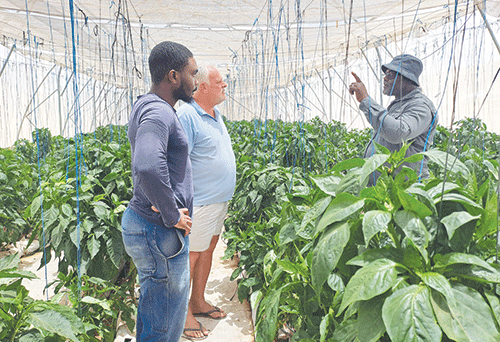Cecilia Xavier
KHOWARIB – The Khowarib Green Scheme project, which was initiated in 2019 in the Sesfontein constituency, is faring well since Aloe Agriculture Technologies got involved. So far, the project is operating at full-scale, with all irrigation systems commissioned and new crops planted. The garden produces tomatoes, green peppers and a full range of cucurbits.
“The project had a couple of major delays because of Covid, and also challenges like heavy rain in 2021. In 2023, we had major windstorms which came through and destroyed all the net tiles,” said Louis Smith, partner in Aloe Agriculture Technologies, which administers the project.
“We produce the products in the area when a lot of other areas in Namibia can’t produce it because we are in a very hot and dry climate zone. So, everything is irrigated, and it’s semi-controlled. All our products are marketed through a company called Green Code, and it all goes to a formal market in Windhoek. We package shelf-ready products,” he boasted.
The garden is expected to fully produce by March 2024.
The Khowarib Green Scheme is funded by the Environmental Investment Fund (EIF).
Smith said part of their corporate social responsibility involves skills transfer to local farmers, offering advice on what crops to plant, and also sourcing a market for them.
“We do a lot of training, as we’ve got a training facility here. People come here, and we also provide services to small-scale farmers around us like assisting them with fertilisers, spraying programmes, how to plant, and we even sell their products for them. They bring their products to us in our warehouse, and we prepare it for the markets with them. In return, a small fee for transport and marketing is deducted, whereafter we pay them their money,” Smith emphasised.
Chief Lucky Kasaona of the Kasaona Traditional Authority commended Aloe Agriculture Technologies for reviving the garden. However, he requested government to transform the local community garden into a suitable garden.
“I went to the open field there, and I saw the crops. It was amazing, and I am still of the thinking that I want the community garden to look like this one. That is my standpoint. But the problem that we are facing today is infrastructure of the community garden, like the water installations and the fence. We’d be happy if we can be provided with materials by the government,” he said.
The gardening project employs 20 local people and two foreign technical experts.
*Cecilia Xavier works for the Ministry of Information and Communication Technology in Opuwo.


